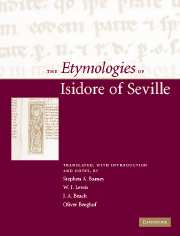Book contents
- Frontmatter
- Contents
- Acknowledgements
- Note to the Reader
- INTRODUCTION
- THE ETYMOLOGIES
- Analytical table of contents
- Book I Grammar (De grammatica)
- Book II Rhetoric and dialectic (De rhetorica et dialectica)
- Book III Mathematics (De mathematica)
- Book IV Medicine (De medicina)
- Book V Laws and times (De legibus et temporibus)
- Book VI Books and ecclesiastical offices (De libris et officiis ecclesiasticis)
- Book VII God, angels, and saints (De deo, angelis et sanctis)
- Book VIII The church and sects (De ecclesia et sectis)
- Book IX Languages, nations, reigns, the military, citizens, family relationships (De linguis, gentibus, regnis, militia, civibus, affinitatibus)
- Book X Vocabulary (De vocabulis)
- Book XI The human being and portents (De homine et portentis)
- Book XII Animals (De animalibus)
- Book XIII The cosmos and its parts (De mundo et partibus)
- Book XIV The earth and its parts (De terra et partibus)
- Book XV Buildings and fields (De aedificiis et agris)
- Book XVI Stones and metals (De lapidibus et metallis)
- Book XVII Rural matters (De rebus rusticis)
- Book XVIII War and games (De bello et ludis)
- Book XIX Ships, buildings, and clothing (De navibus aedificiis et vestibus)
- Book XX (Provisions and various implements)
- APPENDIX Correspondence of Isidore and Braulio
- INDEX
Book X - Vocabulary (De vocabulis)
Published online by Cambridge University Press: 22 September 2009
- Frontmatter
- Contents
- Acknowledgements
- Note to the Reader
- INTRODUCTION
- THE ETYMOLOGIES
- Analytical table of contents
- Book I Grammar (De grammatica)
- Book II Rhetoric and dialectic (De rhetorica et dialectica)
- Book III Mathematics (De mathematica)
- Book IV Medicine (De medicina)
- Book V Laws and times (De legibus et temporibus)
- Book VI Books and ecclesiastical offices (De libris et officiis ecclesiasticis)
- Book VII God, angels, and saints (De deo, angelis et sanctis)
- Book VIII The church and sects (De ecclesia et sectis)
- Book IX Languages, nations, reigns, the military, citizens, family relationships (De linguis, gentibus, regnis, militia, civibus, affinitatibus)
- Book X Vocabulary (De vocabulis)
- Book XI The human being and portents (De homine et portentis)
- Book XII Animals (De animalibus)
- Book XIII The cosmos and its parts (De mundo et partibus)
- Book XIV The earth and its parts (De terra et partibus)
- Book XV Buildings and fields (De aedificiis et agris)
- Book XVI Stones and metals (De lapidibus et metallis)
- Book XVII Rural matters (De rebus rusticis)
- Book XVIII War and games (De bello et ludis)
- Book XIX Ships, buildings, and clothing (De navibus aedificiis et vestibus)
- Book XX (Provisions and various implements)
- APPENDIX Correspondence of Isidore and Braulio
- INDEX
Summary
1. People are for the most part unaware of the origin of certain terms. Consequently we have included a number in this work for their informational value.
Certain terms for human beings (De quibusdam vocabulis hominum) Although the origin of terms, whence they come, has received some accounting by philosophers – such that by derivation ‘human being’ (homo) is so called from ‘humanity’ (humanitas), or ‘wise person’ (sapiens) from ‘wisdom’ (sapientia), because wisdom comes first, then the wise person – nevertheless a different, special cause is manifest in the origin of certain terms, such as homo from ‘soil’ (humus), from which the word homo properly is so called. From such derivations, as examples, we have set forth a number in this work.
A. 2. Aeros (i.e. heros, “demi-god, hero”), a strong and wise man. Author (auctor), so called from ‘augmenting’ (augere); moreover, auctor cannot be used in the feminine gender – for there are some terms that cannot be inflected in the feminine, such as ‘runner’ (cursor). Agent (actor), from acting (agere). 3. Foster-son (alumnus), so called from fostering (alere), although both he who fosters and he who is fostered can be called alumnus – that is, he who nourishes and he who is nourished – but still, the better use is for one who is nourished. 4. Friend (amicus), by derivation as if from the phrase ‘guardian of the spirit’ (animi custos). 5.
- Type
- Chapter
- Information
- The Etymologies of Isidore of Seville , pp. 213 - 230Publisher: Cambridge University PressPrint publication year: 2006

